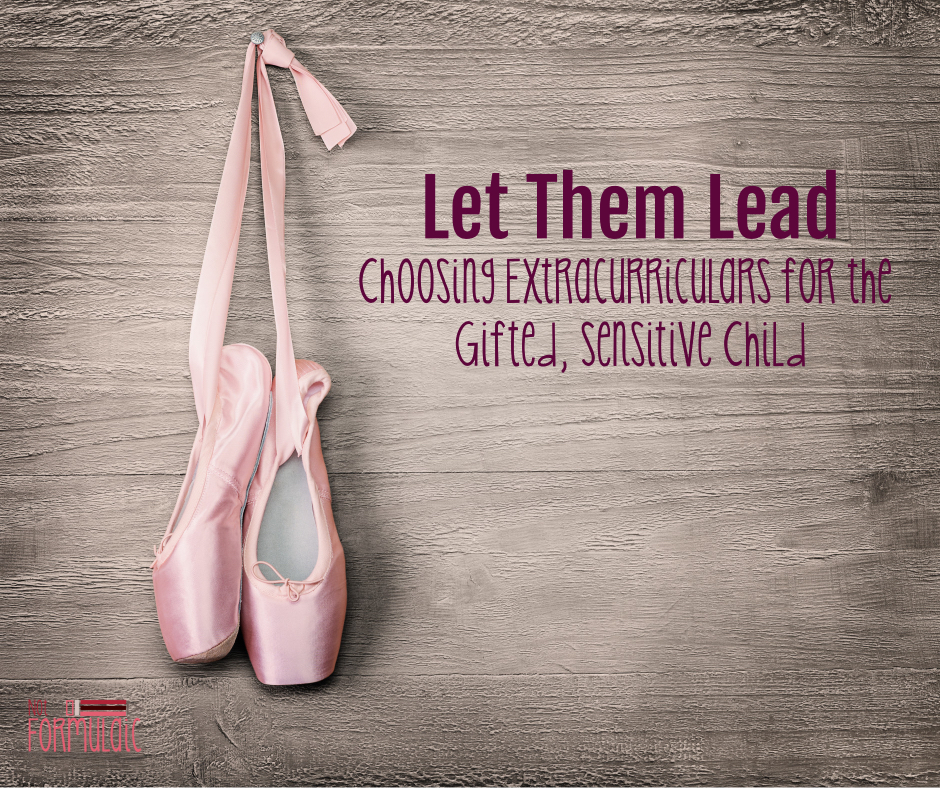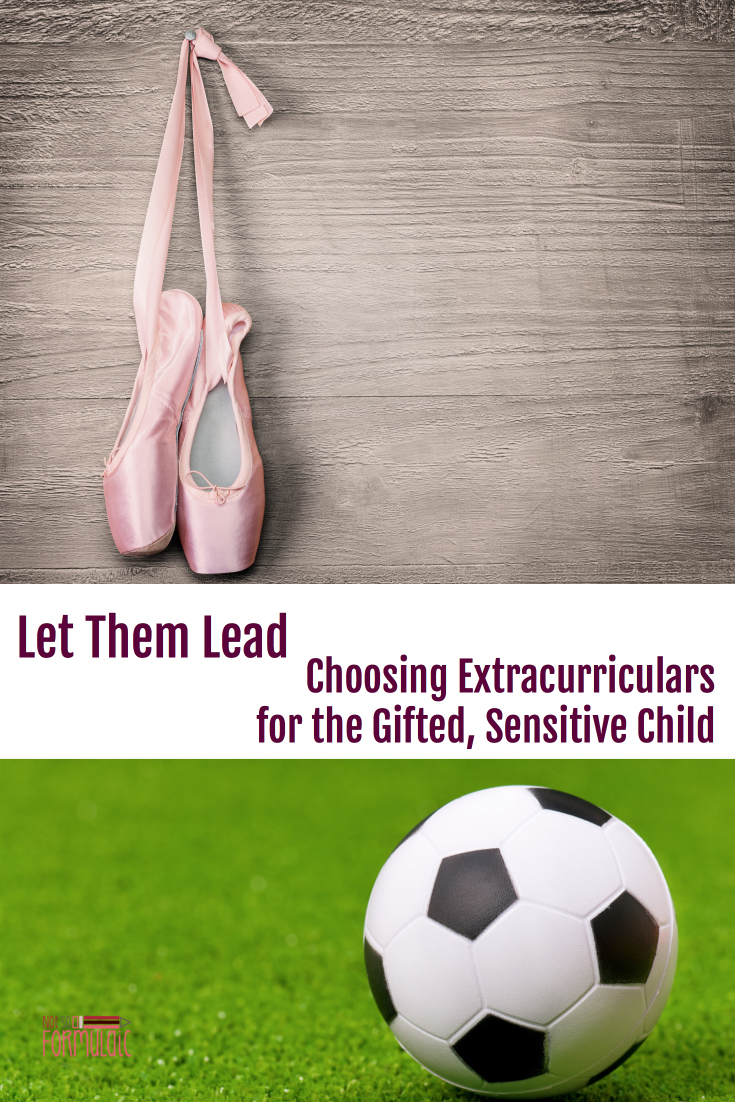Sensitive, gifted children can be a mystery even to their parents, and finding the right sport or creative outlet can be tough. Here’s how to seek out and match your child with the right extracurricular activity, one that will nourish both body and soul.
It started the second week of preschool. Three mornings a week, three hours a day. My social butterfly, my natural leader, my people pleaser, clinging to my leg and sobbing at the classroom door.
“No, Mommy. Don’t go!”
Normal separation anxiety, they said. “It peaks the second week.”
By early November the teachers were concerned.
From the first quarter progress report:
“Fixates on your absence.”
“Difficult to distract.”
From the telephone conference:
“Most kids recover in the first five minutes. She takes much longer. Maybe you should have her evaluated?”
We tried ballet class. She had her favorite tutu and sparkly shoes. She bounced in the room bursting with excitement but spent the class in the corner with her arms crossed. Tears lined her bottom lid.
“She’s got excellent body awareness and she’s smart as a whip, too. But she needs to work on the shyness. It’s damaging her ability to participate.”
Soccer practice. Coveted team jersey; comfortable cleats. She ran for the field with her ball, then sulked from the sidelines while the other kids played.
“She’s exhibiting defiant behavior. Please work with her if you want her to stay on the team.”
It wasn’t just activities and events that were problematic.
At home, she was afraid to go outside in cloudy or windy weather. She was waking several times a night from terrifying dreams and the fear of being alone. She would break down in tears at random, realizing that evil existed in the world. I was frustrated and embarrassed, ignoring textbook examples of Dabrowski’s emotional and imaginational overexcitabilities. Truthfully I was lost in them myself, running off a cliff of desperate scenarios:
My daughter would be a hermit.
My daughter would be an outcast.
My daughter would be unable to function as an adult.
My daughter would have unstable, unsatisfying relationships.
My daughter would be afraid to go swimming at the beach (because priorities).
It had to be dealt with. Swiftly.
I huffed. I puffed. Like an unhinged mama wolf on steroids, I would blow down the house of cards she had built around her fragile heart.
She would start enjoying life. Or else.
***
She came into my room crying.
“I don’t want to leave, mommy.”
“It’s bedtime, honey. We’re not going anywhere.”
“I’m walking to Grandma’s. If I go, it will be two kids instead of three and your life will be much easier….”
She had a bag. It held her hairbrush, her wooden rosary, an old unicorn slipper, five stuffed animals, and a rubber snake.
Walking to Grandma’s, she said. To make things easier on me.
***
Or else what, Ginny?
Society equates precocity and intellectual prowess with maturity and poise. But intense physical, sensual, emotional and imaginational characteristics lead to social and emotional struggles in the outside world. A gifted child’s academic experiences, creative outlets, and physical interests end up bearing the brunt of it. Parents push their children into all manner of classes and activities from infancy. I saw it in the classroom, and I saw the toll it took on my students. I swore I would never become one of those parents.
And now I had.
At five it’s running to Grandma’s. What will it be at 15? Will she find herself awash in self-doubt and anxiety, making decisions out of fear? Will she follow in the footsteps of “Genius Girl,” a local high school senior who faced such intense pressure to succeed at our local STEM magnet school that she concocted an elaborate hoax, convincing parents and classmates that Stanford and Harvard were fighting over her in an admissions tug of war?
Not if I can help it. Forcing her to face her anxieties does nothing to alleviate them. While some would argue this builds character, I argue it builds mistrust.
I had taken her to activities she had begged to join only to see her floundering and misunderstood. Rather than listen to her cries for help, I bought the lie that continued exposure would eventually lessen the blow. It did not. Rather, it forced this beautiful, vulnerable child to pack a bag and plan an escape to lessen her burden on the family.
No child deserves to feel like a burden.
How to Find the Perfect Activity for Your Sensitive, Gifted Child
There’s no harm in pursuing activities in which your child shows interest. But when you’re dealing with a sensitive child, it’s imperative that parents listen and follow the child’s lead.
Choose activities that welcome parent observation
You don’t have to stay inside the room or hover during the whole class. An occasional peek in the door or casual stroll by the field can work wonders for a sensitive child, especially during the first few sessions. Since my daughter struggles with separation anxiety, it’s frequently a matter of just letting her know I’m there. Other children might need a quiet thumbs-up of approval until they are more comfortable – it just depends on the individual need.
Frontload a child’s expectations
Sensitive, gifted children often have preconceived ideas about what a situation or activity will be like. When the reality differs from expectation, the emotional toll can be tough. To avoid this, provide as much information about the activity or sport as you can. Watch videos, observe practices, and talk to mentors and coaches ahead of time. Your children will be much more likely to have a positive experience if expectations and reality match.
Choose groups and mentors with whom your child is familiar
While this isn’t always possible, it helps to place sensitive children with peers and adults with whom they already have formed positive relationships. Do you have a neighbor who coaches a soccer team? Friends who take dance at a local studio? Familiarity with people and places can alleviate a great deal of anxiety for sensitive children.
Meet coaches, teachers, and peers in advance
Sometimes familiar placement isn’t possible, and there’s nothing wrong with that. Try shadowing a team or a class for a few days to get a feel for it, or take your child to meet those involved ahead of the activity’s start.
My kiddo has grown a great deal since the second week of preschool, and it’s been quite a while since she’s threatened to run away.
But her sensitivity will always be a part of her, and I’m glad for that.
It’s going to serve her well someday.
[rad_rapidology_inline optin_id=”optin_1″]
Enjoy this post? Read on:
Finding her Pack: Intellectual Peers and Community in a Gifted Child’s Life
Growing up Gifted: Navigating the Real World with a Gifted Child
The Smartest Thing I’ve Ever Done is Learn to Love My Children
Getting Out of Survival Mode: When Gifted Homeschooling is a Drag


Aww that’s so sad! Having been in the same situation (5yo wanted to leave and go to Grandma’s) it’s amazing how much pressure they’re under for things that we might not even notice. Good post, and a good reminder to spend more time listening to my kid (including what he’s not saying.)
It’s what they don’t say that matters the most, isn’t it?
This is a beautifully written piece. I saw my family in it, too. Heartbreaking for all involved. So important to listen to our children <3
Thanks, Caitlin. It’s really encouraging to know we’re not alone, isn’t it?
This is beautiful. <3 to you for following her lead. I know it can be hard to do, particularly with all the advice to the contrary!
Thank you, Kathleen! It is hard. I’m so glad to have found some kindred spirits through GHF.
I’ve been letting my kids lead when choosing their extracurricular activities. But things don’t always happen as expected. My second child told me before that he wants to have voice and piano lessons also at home. I already found a teacher and got them acquainted. But when it wa7 time to have his scheduled lessons, he said that he’d rather play with his toys and big brother. So, we didn’t push through with it. He was 3 years old then.
Beautiful post. I’m not sure why, but we’re often told not to trust what our kids are telling us, as though we know their inner experience better than they do. And it’s so easy to fall into that trap. Life is so much easier when we simply trust what kids are telling and showing us. You seem to be a great mama!
Thanks, Heather. And you’re right – it’s like the adult world assumes children are clueless when it comes to knowing themselves.
What a poignant story – and one that resonates on so many points. Thank you for making me cry, and laugh (the beach!) and reminding me that I’m not alone in trying to help my son find his place in the world.
Thanks, Lucinda. It’s not easy, is it?
I so agree with letting the child lead. My kiddo was such a physically active child, so we let her try out a preschool gymnastics class. She loved it. Next, she wanted to try ballet. But it was too structured for her ,and she wanted to jump and hop instead of “float around” (her words) like in ballet. Then she say an irish dance class and wanted to try that. That was a keeper. She continued in that for years, and loved it. We had an easier time, than your daughter did, but I sure see the benefit of letting the child lead, especially in outside classes. I really enjoyed your article.
My lovely 9 year old would scream, throw a fit at every transition…but would settle in nicely to an activity, only to come home and melt down because she couldn’t problem solve a social situation or (more common) was over stimulated and needed down time now. I discovered that in order to get to said activity, I would have to reframe her expectations. Let’s not worry about dance classs NOW, its 3 days away, let’s wait until the day of dance than we can worry about it (because worrying from now until than won’t fix anything). Than we would get to dance day…let’s worry about that when its time to get ready. Than at “getting ready time”…let’s just get dressed and we will worry about dancing aftewards (and so on and so on) until we get to the dance class door, and her friends are there and her sisters are all eager to go, and suddenly she is eager to go in too! I stay (of course) at the facility, and only have the melty over stimulated response at the end to deal with (lots of deep breathing, and quiet space, good book). It has worked miracles on our fear of going to BIG things that she’s worried about.